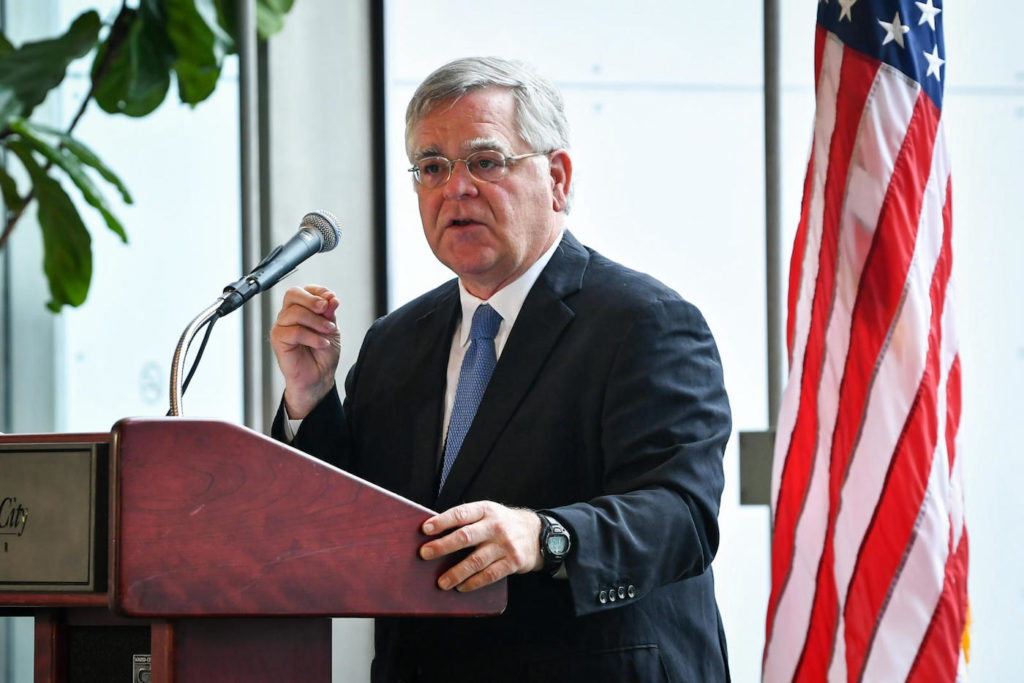
Nashville Mayor John Cooper used his annual address to the Metro Council and all of the city on Thursday morning to reflect on the difficulties of the past year and to present his vision for a better year to come.
Echoing a campaign theme from 2019, he said in his State of Metro speech that his goal is to make sure Metro “works for everyone.”
“A city on the rise must rise to the occasion,” Cooper said. “Today, Nashville is on the rise. We have proved our resilience. In this past year, we have faced more challenges and helped more people than at any time in our history.”
The mayor has shared his priorities. They include:
- Record spending for Metro Nashville Public Schools, adding $81 million over last year, meeting the full request of the school board. Teacher salary increases for teachers — on average up $6,294 — are included.
- Restoration of $25 million for the WeGo transit agency, creation of a traffic management center with “smart” traffic signals and the launch of a new standalone Department of Transportation.
- Increased spending of $22 million — that’s roughly a tripling — on affordable housing. That includes more for the Barnes Fund and the use of federal pandemic relief dollars.
For taxpayers, the mayor is proposing not touching the property tax rate after it has been automatically adjusted to a lower rate. That is tied closely to the recent countywide property reassessment. The rate will be $3.288 per $100 of assessed value. Because the city’s median property value increase was 34.05%, any property owners who saw values rise above that level should expect somewhat higher tax bills.
The entire budget still must go through review and potential amendment by the Metro Council.
More: Read the full text of Cooper’s speech (PDF), or view the event on YouTube.
Among other topics, the mayor acknowledged that 903 Nashvillians have been killed by COVID-19 and that 40% of residents are now vaccinated.
He touted his hopes that software giant Oracle will soon bring more than 8,000 jobs to the city. And he noted that Metro employees can expect a 2% cost-of-living adjustment and “step” increases in his budget.
Councilmember Zulfat Suara says she’s excited about the Oracle deal because of its proposed partnership with schools and the potential job creation. But it didn’t come without concern for current residents.
“At the back of my mind, as affordable housing chair, I also knew that bringing people in will create more problems on affordable housing,” she says. “Because we’ve had a problem and this is just going to make it worse.”
The mayor also praised Nashville voters for bringing record diversity to the Metro Council, though he did not make reference to lacking diversity on the city’s board and commissions.
The mayor is proposing higher spending for several Metro agencies. That includes a 49% increase for the Office of Emergency Management, a 62% increase for the Metro Office of Family Safety and 14% more for Metro General Hospital. An allotment of $12.2 million would hire 48 new police officers for a new Southeast Police Precinct — although an overall policing budget isn’t expected until Friday.
“A thriving community doesn’t come about easily. And it doesn’t happen by accident. It requires conviction, intention and collaboration,” Cooper said.
Mayor Cooper takes the stage “city on the rise must rise to the occasion” pic.twitter.com/oNkiwwHyR1
— ambriehl (@ambriehlc) April 29, 2021
A socially distanced address
The annual address to the city council also signals the beginning of Metro’s budgeting season, which culminates with a final council vote on the city budget in late June.
Cooper spoke to a socially distanced crowd of over 100 people, most were city officials or employees, gathered at the Music City Center. The event included ceremonial components, including blessings and prayers, music by the Fisk Jubilee Singers, a reading by Nashville’s youth poet laureate, Marie Shields, and remarks by Vice Mayor Jim Shulman.
In the lead-up to the speech, WPLN News asked listeners what they wanted the mayor to address. We heard concerns about rising housing costs, commuter options and the new property tax rate.
Public transportation has been a big focus for the last several mayors, with several expensive proposals that called for major expansions, but none has managed to make much happen. Last year, Cooper unveiled a plan that looks to tweak the current bus system before asking for new funding.
In last year’s State of Metro, Cooper warned that the city was in dire financial situation, and the city ended up raising the property tax 34%. Cooper recently indicated rising property values will mean the rate can be largely dialed back, but WPLN News is listening for any more detail he might give on taxes and the city’s balance sheet.
Since the last State of Metro, Nashville has installed a new police chief and settled on the powers of the Community Oversight Board that watches what the police do. But there have also been several incidents this year in which police shot and killed people, and questions remain over whether the Christmas morning bombing could have been prevented.
“In a time like now, adding money to the police budget is something that should receive a lot of scrutiny,” says Tyler D’Andrea of East Nashville, who works for an educational nonprofit and wanted to see more money put into social programs. He responded to WPLN’s callout asking what the mayor should confront in his speech.
Cooper is reaching the midway point in his first term as mayor. He served on council for several years before that. And he comes from a political family. His brother, Jim Cooper, represents Nashville in Congress. Their father, Prentice, was Tennessee’s governor, although that was more than a decade before the mayor was born.
This is a developing story that will be updated.

